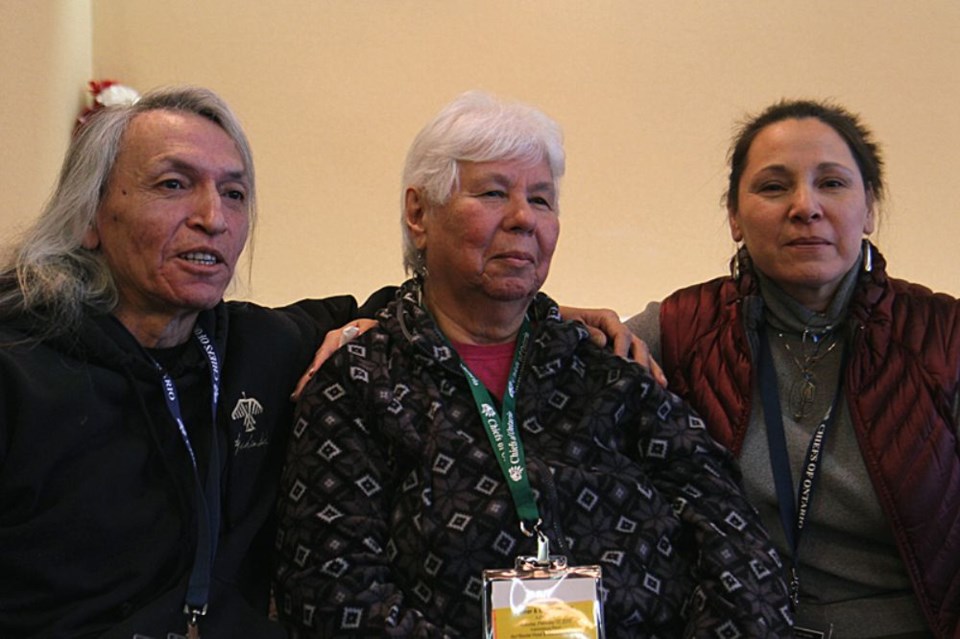THUNDER BAY – It has been 20 years since Maggie Cywink lost her sister.
The body of her 31-year-old sister, Sonya Nadine Mae Cywink, was found on Aug. 31, 1994 more than 60 kilometres from where she had last been seen in London, Ont.
She is one of more than 1,100 indigenous women who have been killed or disappeared across the country since 1980.
Family members of murdered and missing indigenous women will share their stories in a Chiefs of Ontario hosted three-day gathering that opened Tuesday at the Nor’wester Hotel and Convention Centre.
“We have to be heard at the ground level. This is a foundational change for us. Meeting together as women, families and loved ones I think will garner strength for the movement to seek justice within our First Nations communities,” Cywink said.
“I believe we can’t force anyone, including the government, to care about an inquiry or where we’re at with this until our people come forward, make a stand amongst ourselves and show the world we’re standing up against violence against women.”
It’s also about providing families with a voice and showing that there are people who are ready to listen and take what happened to their loved ones to make change.
That’s a primary reason why Aileen Joseph attended the gathering to tell the delegates about her daughter, Shelley, a mother of four who was murdered in July 2004.
“It’s so she won’t be forgotten,” Joseph said through tears when asked about why she was speaking out.
Ontario Regional Chief Stan Beardy, who lost his son to violence, appreciates the importance of preserving the memories.
“The greatest fear when you lose a loved one is that the loved one will be forgotten,” Beardy said. “I think this gives hope to the families, to the communities and to our nations that finally we will do something to maintain the memories and seek the truth.”
Denise Stonefish, chair of the First Nations Women’s Caucus, said it’s important to hear from the families about what the women went through, as heart wrenching as it is.
That will allow leaders to identify potential patterns and similarities that can be identified as root causes.
“We felt hearing their stories will help us move towards a larger process that will provide truth-seeking, recommendations of how we move forward to end violence in our communities,” Stonefish said.
Cywink said her sister was hit by early life trauma, which spiralled into a lengthy list of other problems. She believes that will be common theme heard throughout the gathering.
“She suffered from all of the things that caused our women to get to the point of desperation including early pregnancy, dropping out of high school, getting into questionable relationships, drug abuse and eventually she got to the point where she was a sex trade worker,” Cywink said.
“Because she was never able to fix her problem in the beginning this made her sink deeper, quickly, into a life she was never able to recover from.”
The organization hopes the gathering will be the start of the process towards sparking a First Nation-led inquiry, as well as a national inquiry into missing and murdered indigenous women. The gathering will also include appearances by federal Liberal Leader Justin Trudeau and newly elected Assembly of First Nation National Chief Perry Bellegarde.
A national roundtable discussion, which will include federal government representation from Minister for the Status of Women Kellie Leitch and Minister of Aborigional Affairs Bernard Valcourt, has been scheduled for Feb. 27 in Ottawa.
While it doesn’t satisfy the calls for an inquiry, it is one step in the right direction.
“I know that across the country premiers have supported the call for a national inquiry. Even though this is not leading up to a national inquiry, I’m hoping the results of the national roundtable will hopefully secure a national inquiry to be commissioned,” Stonefish said.
Learning the reasons why so many women have gone missing or been killed is critical to ensuring it stops happening.
Cywink shares her story in hopes that it might one day save the life of at least one woman.
“If we don’t, as First Nations, start to change, it’s just going to continue. Unfortunately, what I feel can happen is that if we don’t care why should anyone else,” she said.
“When we start sharing these stories and getting deeply into the root causes I think that’s going to wake up some families on First Nations that realize they have a daughter who starts acting out or started having other issues.”
